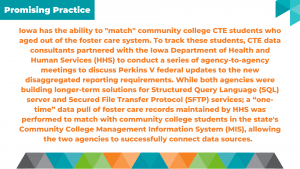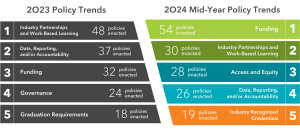This week, the U.S. Department of Education (ED) proposed significant changes to state Perkins V plans and related reporting requirements, which have significant implications for the law’s ongoing implementation. Elsewhere, Congress continues to grapple with the need to fund the federal government beyond an important upcoming deadline and more.
ED Proposes Changes to Perkins V State Plans and Reporting
 This week, the U.S. Department of Education’s (ED) Office of Career, Technical, and Adult Education (OCTAE) published two new proposals that would significantly impact state and local implementation of the Carl D. Perkins Career and Technical Education (CTE) Act (Perkins V). These new changes to Perkins V state plan requirements and related annual data collections seek to standardize the way in which states and local Perkins V recipients collect and report information related to CTE student performance. Separately, these proposals would increase the broader information gathered by ED via state Perkins V state plans.
This week, the U.S. Department of Education’s (ED) Office of Career, Technical, and Adult Education (OCTAE) published two new proposals that would significantly impact state and local implementation of the Carl D. Perkins Career and Technical Education (CTE) Act (Perkins V). These new changes to Perkins V state plan requirements and related annual data collections seek to standardize the way in which states and local Perkins V recipients collect and report information related to CTE student performance. Separately, these proposals would increase the broader information gathered by ED via state Perkins V state plans.
As noted in the related proposals, these changes will require every state and territory to submit new or substantially amended four-year Perkins V plans by 2026—an effort and wider process states and territories just completed this year. Comments on these proposals are due back to ED no later than November 12, 2024. Advance CTE is continuing to analyze these proposals and plans to formally provide feedback to the Department as part of this comment period.
Progress on Stopgap Funding Legislation Stalls
This week both chambers of Congress returned to Capitol Hill following its annual August recess period. As Advance CTE shared last week, Republican leaders had been intending to introduce legislation, known as a continuing resolution (CR), to temporarily extend current funding levels for all federal programs, including Perkins V’s basic state grant program, through the early part of 2025. This six-month funding extension is strongly opposed by the Biden administration and the Senate, who prefer a shorter-term CR lasting through mid-December—timing that would coincide with the lame-duck session of the current 118th Congress.
Despite this opposition, House Republican leadership attempted to move forward with this six-month CR, which also contained controversial provisions related to upcoming elections. However, support for this proposal remained uncertain within the House Republican conference, with several GOP lawmakers indicating opposition to this approach. This opposition caused Speaker Mike Johnson (R-LA) to pause further consideration of this CR, at least for the time being. With the start of the 2025 federal fiscal year (FY25) set to begin on October 1, it remains unclear how lawmakers plan to move forward with federal funding for the government beyond this date. As these efforts continue to take shape, Advance CTE will continue to advocate for a strengthened investment in state CTE systems made via Perkins V.
Advance CTE Signs Onto Letter Endorsing Workforce Pell Grant Passage
This week, Advance CTE joined other national and state-based organizations in sending a letter to congressional leadership supporting expanding the federal Pell Grant program to include learners enrolled in high-quality, shorter-term CTE programs. Such legislation has been a longstanding federal policy priority for Advance CTE as a key strategy to provide more learners with quality postsecondary pathways that lead to careers in growing sectors of the economy. The letter also notes these efforts’ critical role in supporting ongoing federal investments in the nation’s infrastructure, advanced manufacturing, and green energy sectors.
HELP Republicans Hold K-12 Education Roundtable
On Tuesday, Senator Bill Cassidy (R-LA) hosted a roundtable to discuss ways to innovate within K-12 education systems to improve learner success. Sen. Cassidy, the ranking member of the Senate Health, Education, Labor, and Pensions (HELP) Committee, was joined by Senators Katie Britt (R-AL), Tommy Tuberville (R-AL), and Joni Ernst (R-IA). Invited panelists discussed innovations in virtual reality, artificial intelligence, work-based learning, and micro-schools throughout their opening remarks and in response to the Senators’ questions.
Ruben Morris, the founder of Alabama Aerospace and Aviation High School, spoke about the need for education to reflect local workforce needs built on public-private partnerships. When Sen. Cassidy asked about available funding through Alabama’s Perkins V investment, Ruben shared that he uses Perkins V funding to support further program growth. He also shared ways in which his community leverages this critical federal investment in CTE, including supporting the development of programming for learners that enables their entry into the aviation economy in the state.
Biden Administration Announces Grants to Recruit Diverse Workforce
Last week, the U.S. Department of Education (ED) announced over $28 million in newly awarded funds through the Teacher Quality Partnership (TQP) program. This latest grant round aims to recruit, prepare, develop, and retain a diverse educator workforce nationwide. The TQP program funds teacher preparation programs in high-need communities for learners at colleges and universities and in teacher residency programs and aims to encourage more people to pursue careers in teaching through Grow Your Own programs. ED announced the list of award recipients alongside new data on Public Service Loan Forgiveness approvals in each state.
Rob Young, Communications & Advocacy Associate
Steve Voytek, Policy Advisor



 My name is Ada Ejiogu, and I am delighted to be joining Advance CTE as the senior director of operations. I will be leading the organization’s operations and financial strategies, ensuring they are efficient, effective, and grounded in principles of equity, inclusion, and compliance.
My name is Ada Ejiogu, and I am delighted to be joining Advance CTE as the senior director of operations. I will be leading the organization’s operations and financial strategies, ensuring they are efficient, effective, and grounded in principles of equity, inclusion, and compliance. 

 I am thrilled to join the Advance CTE team as a communications & advocacy associate. As part of the Communications Team, I will wear many hats, but my work will primarily be federal policy-focused. As part of this work, I will continue and support our weekly Legislative Updates and monthly member-only federal policy events, track federal legislation, and support resource development to connect our members to federal resources related to CTE.
I am thrilled to join the Advance CTE team as a communications & advocacy associate. As part of the Communications Team, I will wear many hats, but my work will primarily be federal policy-focused. As part of this work, I will continue and support our weekly Legislative Updates and monthly member-only federal policy events, track federal legislation, and support resource development to connect our members to federal resources related to CTE. 
 Jennae Overton’s journey through both the Natural Resources and Business CTE programs illustrates how CTE can cater to diverse interests and skills. Drawn to both
Jennae Overton’s journey through both the Natural Resources and Business CTE programs illustrates how CTE can cater to diverse interests and skills. Drawn to both  Helen Ramos, a first-generation Hispanic learner in the Redesign Teacher Academy and member of the Educators Rising CTSO, brings attention to the evolving landscape of representation in education. Her experience highlights the progress made in diversifying the teaching workforce while also pointing out areas for improvement. Helen notes that while her English proficiency sometimes led to assumptions about her understanding, she also became a valuable resource in helping English Language Learners (ELLs) in her program. “My friends would get papers that were translated and the teacher would tell us to help them and I would volunteer,” she shares. Helen’s journey underscores the need for CTE programs to be mindful of language barriers and cultural differences.
Helen Ramos, a first-generation Hispanic learner in the Redesign Teacher Academy and member of the Educators Rising CTSO, brings attention to the evolving landscape of representation in education. Her experience highlights the progress made in diversifying the teaching workforce while also pointing out areas for improvement. Helen notes that while her English proficiency sometimes led to assumptions about her understanding, she also became a valuable resource in helping English Language Learners (ELLs) in her program. “My friends would get papers that were translated and the teacher would tell us to help them and I would volunteer,” she shares. Helen’s journey underscores the need for CTE programs to be mindful of language barriers and cultural differences.